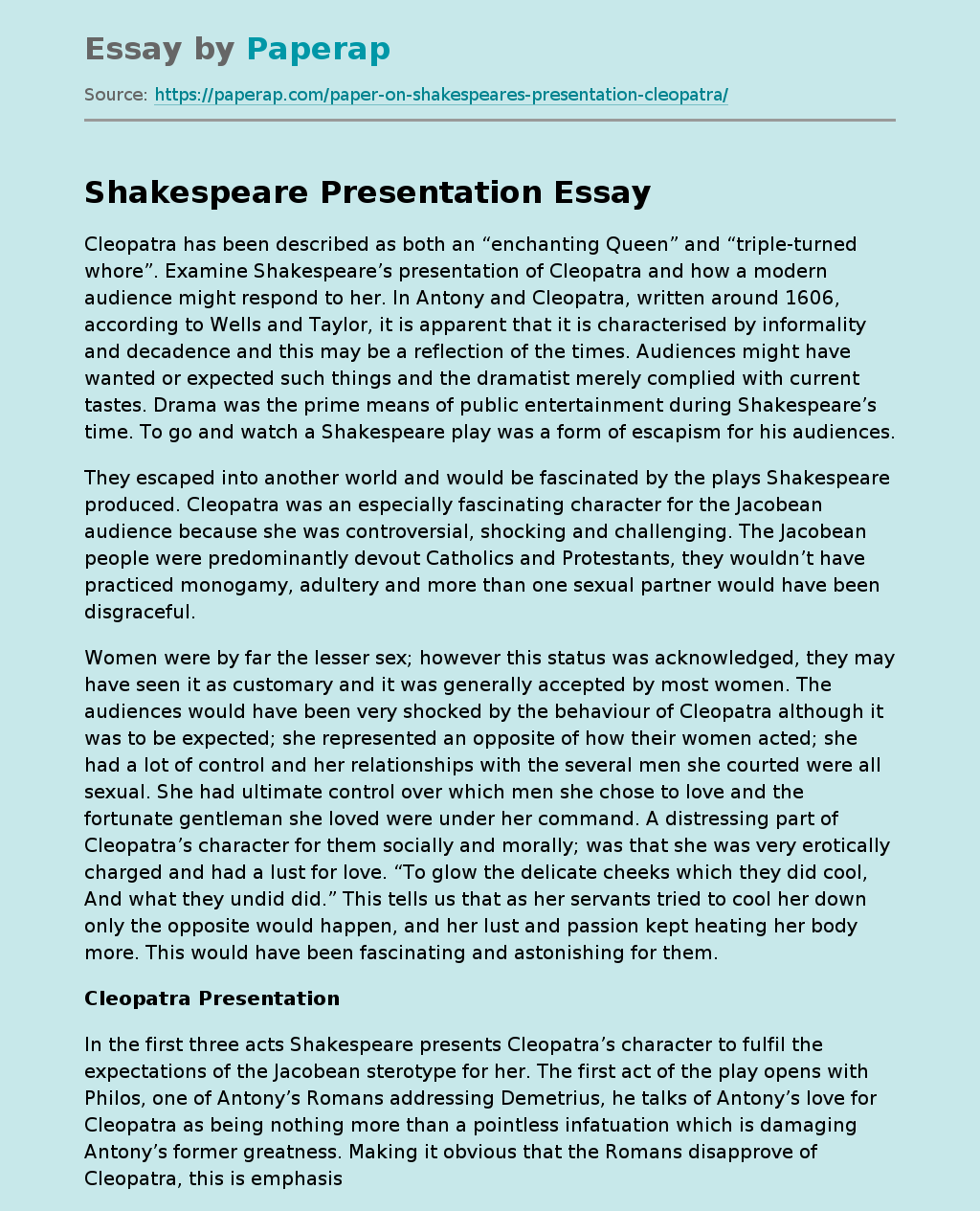Shakespeare’s Performance of Cleopatra
The following is a sample essay on Shakespeare’s representation of Cleopatra. Read the introduction, body and conclusion of the essay, scroll down.
Cleopatra has been described as both an “enchanting Queen” and “triple-turned whore”. Examine Shakespeare’s presentation of Cleopatra and how a modern audience might respond to her. In Antony and Cleopatra, written around 1606, according to Wells and Taylor, it is apparent that it is characterised by informality and decadence and this may be a reflection of the times.
Audiences might have wanted or expected such things and the dramatist merely complied with current tastes. Drama was the prime means of public entertainment during Shakespeare’s time. To go and watch a Shakespeare play was a form of escapism for his audiences.
They escaped into another world and would be fascinated by the plays Shakespeare produced. Cleopatra was an especially fascinating character for the Jacobean audience because she was controversial, shocking and challenging. The Jacobean people were predominantly devout Catholics and Protestants, they wouldn’t have practiced monogamy, adultery and more than one sexual partner would have been disgraceful.
Women were by far the lesser sex; however this status was acknowledged, they may have seen it as customary and it was generally accepted by most women. The audiences would have been very shocked by the behaviour of Cleopatra although it was to be expected; she represented an opposite of how their women acted; she had a lot of control and her relationships with the several men she courted were all sexual.
She had ultimate control over which men she chose to love and the fortunate gentleman she loved were under her command. A distressing part of Cleopatra’s character for them socially and morally; was that she was very erotically charged and had a lust for love. “To glow the delicate cheeks which they did cool, And what they undid did.” This tells us that as her servants tried to cool her down only the opposite would happen, and her lust and passion kept heating her body more. This would have been fascinating and astonishing for them.
Cleopatra Presentation
In the first three acts Shakespeare presents Cleopatra’s character to fulfil the expectations of the Jacobean sterotype for her. The first act of the play opens with Philos, one of Antony’s Romans addressing Demetrius, he talks of Antony’s love for Cleopatra as being nothing more than a pointless infatuation which is damaging Antony’s former greatness. Making it obvious that the Romans disapprove of Cleopatra, this is emphasised when Antony and Cleopatra enter, and he tells Demetrius to take note of “the triple pillar of the world transformed/into a strumpets fool”.
This gives the audience the immediate impression of the power Cleopatra has over Antony which is emphasised on several occasions throughout the play. Cleopatra is first shown to us in her court, provocative and teasing towards Antony, testing him already to see where his loyalties and affections lie: Where’s Fulvia’s process? Caesar’s would I say? Both. Call in the messengers. As I am Egypts Qqueen.. When the messenger enters with news for Antony, her manipulative persuasion leads Antony to dismiss him and leave with her.
Anthony
In the Jacobean era, Antony and Cleopatra must have been shocking. The thought that a woman could have that kind of control over a Triumvir, a man of explosive power and privilege, was outrageous. At the time the play was written, Queen Elizabeth I was on the throne. In normal circumstances, this would have been seen as an outrageous act- giving a woman such power. However Elizabeth behaved much like her male counterparts, fighting in war and leading a life of celibacy. Cleopatra did not behave like a queen. She used her power to play games, she flaunted her wealth and laughed at those who scorned her. She was not proper and not ‘right’. But I feel it was also probably very satisfying to see. For once a woman was not only an equal but a superior and she manipulated a man to get her way.
‘Antony and Cleopatra’ was successful because it was entertaining, because it was new and foreign. People didn’t have to accept it because it was art, it was okay to enjoy this without worrying about how factual it was. Also this was a different culture. Cleopatra could be passed off as a foreigner without self control. She was not a threat because she was an Egyptian and did not endanger the English way of life.
Actors on the Shakespearean stage were often youths. Boys with high-pitched voices were trained from early years to take women’s parts, they were capable of playing the mature women since females were not allowed on Elizabethan stage, most difficult for a boy to play a mature, but still sexy woman such a Cleopatra. This technique was adopted for characters in Hamlet and Macbeth.
Shakespeare’s Performance of Cleopatra. (2019, Dec 05). Retrieved from https://paperap.com/paper-on-shakespeares-presentation-cleopatra/

